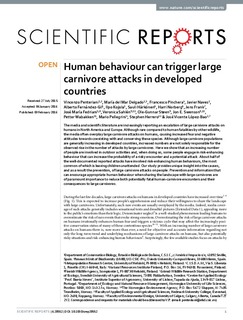| dc.identifier.citation | Penteriani, V., del Mar Delgado, M., Pinchera, F., Naves, J., Fernández-Gil, A., Kojola, I., . . . López-Bao, J. V. (2016). Human behaviour can trigger large carnivore attacks in developed countries. Scientific Reports, 6. doi: 10.1038/srep20552 | nb_NO |
| dc.description.abstract | The media and scientific literature are increasingly reporting an escalation of large carnivore attacks on
humans in North America and Europe. Although rare compared to human fatalities by other wildlife,
the media often overplay large carnivore attacks on humans, causing increased fear and negative
attitudes towards coexisting with and conserving these species. Although large carnivore populations
are generally increasing in developed countries, increased numbers are not solely responsible for the
observed rise in the number of attacks by large carnivores. Here we show that an increasing number
of people are involved in outdoor activities and, when doing so, some people engage in risk-enhancing
behaviour that can increase the probability of a risky encounter and a potential attack. About half of
the well-documented reported attacks have involved risk-enhancing human behaviours, the most
common of which is leaving children unattended. Our study provides unique insight into the causes,
and as a result the prevention, of large carnivore attacks on people. Prevention and information that
can encourage appropriate human behaviour when sharing the landscape with large carnivores are
of paramount importance to reduce both potentially fatal human-carnivore encounters and their
consequences to large carnivores. | nb_NO |
